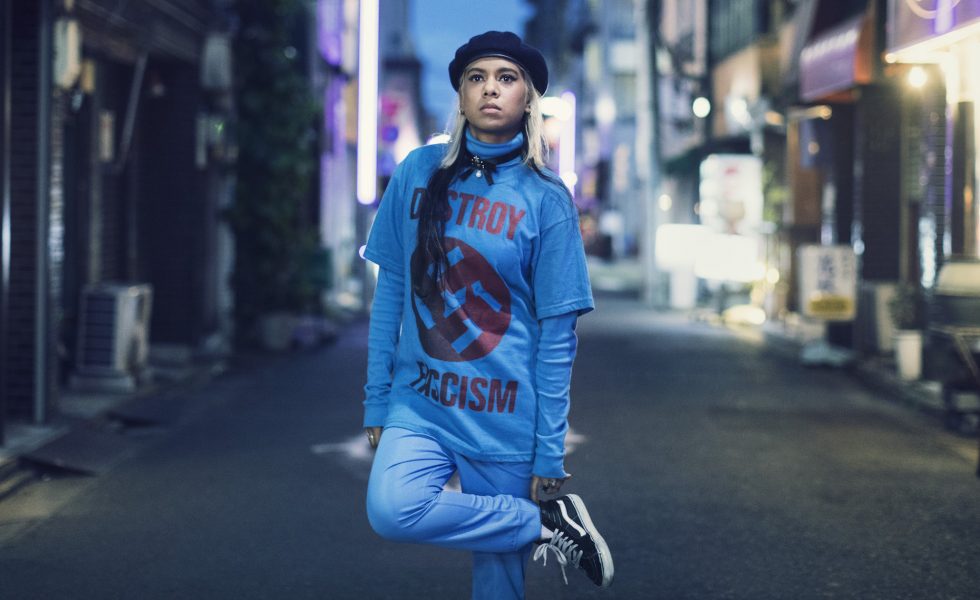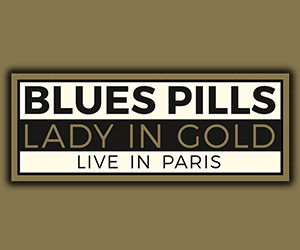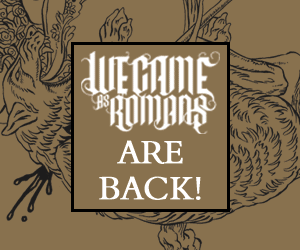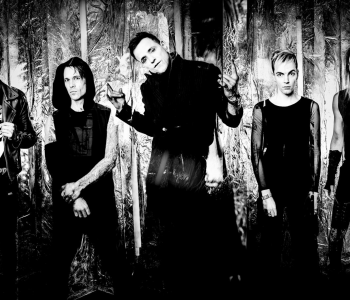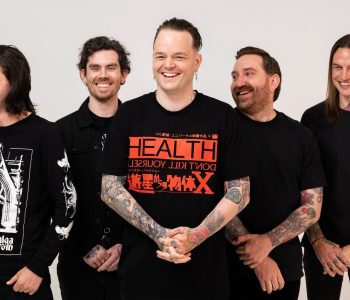Korn‘s Jonathan Davis was so excited by ORGY that he created his own record label …
On record, Ecca Vandal is a million shades of badass. She aims to intimidate, cutting her vicious beats with a strong searing attitude that demands your full submission.
But as we approach her in the homely atmosphere of a quaint Melbourne café, she’s warm and friendly to the point that we’re actually thrown off our tracks for a second. Like the stereotypical grandma that will stop at nothing to feed you, she’s concerned when we turn down an offer for coffee (this scribe had just smashed their third 500ml Monster, another milligram of caffeine may have led to this feature being a posthumous release). It’s unexpected—but then again, Ecca Vandal is the queen of subverting expectations.
MORE: #REALTALK – A Delonge Shot: We Want To Believe, Ecca Vandal’s perfect 10 album review.
Her self-titled debut album is an exercise in rethinking the limits of genre: Ecca Vandal sets expectations with one track, and then destroys them with something completely different, but equally—if not more—exciting. Elements of punk, pop, hip-hop, soul, math rock and complextro fuse to create a record that sits alongside nothing, because there’s nothing else like it. Hysteria caught up with EccaVandal and collaborator/producer Richie “Kidnot” Buxton to vibe on the backstory behind the most exciting release of 2017.
HYSTERIA: There’s a lot of different twists and turns on this record—even moreso than there were on the End Of Life EP. Are you worried about throwing people off with this album, or was that your intention, in a sense? To pull the listener into this wild rollercoaster of sonic curveballs?
Kidnot: I don’t think it was an intentional thing. On a daily basis, Ecca and I will listen to everything from A Tribe Called Quest to Mr. Bungle, to Slayer, to Miles Davis… Like, we just listen to music. And when it comes to writing, it’s not like Ecca says, “I want to write a punk rock song today!” We’ll sit down, she’ll start playing a synth or I’ll come up with a beat, and it just naturally goes from there. We never had this preconceived idea of, “Hey, everyone’s listening to playlists so let’s just make a playlist record.”
Ecca: I don’t necessarily want to throw people off course. What I want to do is introduce them to a bit more of who I am, and I feel like the record does that because it shows all of the different emotions and opinions I have, and all the different sides of my personality. So far, only a little bit has come out sonically and in terms of certain topics and emotions that I’ve put out in my music.
I feel like it’s our responsibility as artists to take from history and from our influences, and absorb them to grow as artists—but also to actually use our own creativity to push those influences forward into something new.
[ Ecca Vandal ]
It makes sense to have the album be self-titled, then!
Ecca: Exactly! I guess the thing is that, at the end of the day, we stepped back and went, “Okay, can we leave this sort of style or sound off the record, or could we leave this sort of style off the record?” And when we got down to it, the only answer was, “No,” because doing that wouldn’t fully represent me. All of those styles are so much a part of who I am, and I feel like everyone needs an opportunity to get to know me through that.
In an age where you’ve got the entire history of music at your fingertips, do you think it’s important to take these huge leaps in sound in order to really leave a mark on people’s minds?
Ecca: I feel like it’s our responsibility as artists to take from history and from our influences, and absorb them to grow as artists—but also to actually use our own creativity to push those influences forward into something new. It doesn’t mean you have to reinvent the wheel or be completely tricky about it, but I think creativity is about actually embracing something new and being diverse. I wanted to take what I was inspired by and push it into something futuristic.
Kidnot: There’s always been artists that create new sounds, and those sounds may not have hit the mark then and there, but down the track, they kind of do. I mean, The Beatles would have done that—they reinvented pop music! Even more recently with people like Bjorn, or even now, like, I remember when Ecca and I first listened to Death Grips and we were just like, “Man, I’ve never heard anything like this before!” It’s these new sonics that you can’t get your head around at first, but when you finally suddenly do, it just sinks in and it’s like, “Wow. This artist is pushing the boundaries, and they’re going to be remembered for that reason.”
That’s the exact thought I had listening to this album! Lyrically, too, I feel like there’s a very real sense of tension on the record. Where does that come from?
Ecca: [The album is] a collection of songs written over the last year, and it’s been one of the most difficult years I’ve gone through. I’ve felt really alone and isolated. It kind of came from having to separate myself to write music—I almost needed to lock myself away just to dig deep and see what I could come out with. And through that process, I felt this really strong loneliness. All of my closest friends moved overseas, so all I could do was just write—I think some of that emotional pain comes through in the record. The other thing was that I put the last little bit of our savings into flying overseas to New York, where we filmed the Broke Days, Party Nights video, so when we came back, we didn’t have all that much to live off—y’know, the music industry is really tough, it’s not like we’re making loads of money or anything—so that was a real struggle for us. We were frustrated, and I think that’s part of what you hear on the record. Also, politically, the world is super grim right now. I had to reconcile that in my mind and ask myself, “How much of this do I put out in my art?” Or, “How much do I protect myself from it?” Because sometimes it’s a wafer-thin line—how much do you throw yourself into what’s going on in the world and let it consume you, and how much do you hold back and just protect yourself to maintain a little bit of joy in your day-to-day life? Because it can really affect me when I know about some of the struggles that people go through out there in the world. It just makes my struggles so much smaller, y’know, and much more real.
It’s interesting—the studio we recorded in is right along the Frankston line, and every 20 minutes, we’d have to stop recording because the trains would go past. If you isolate some of the vocals, you can literally hear the trains going by.
[ Kidnot ]
So taking all of that frustration and pouring it into a song like Broke Days, Party Nights would be a form of catharsis for you, right?
Ecca: Yes! And that’s the privilege of being an artist, I think—you have an outlet to express your frustration, so it doesn’t just sit there and you don’t just wallow in it. We have an opportunity to really express ourselves—half of that is conveyed on the record, and then half of it happens in the live experience, because we actually get to physically express that as well. Being able to let that out is part of the joy of being an artist. It’s our therapy!
How did you strike the perfect balance between the personal and heavy, and the all-out party bangers?
Ecca: I’ve always been driven by music that makes me want to move, both physically and emotionally. That’s kind of what the driving force was whenever I was writing a song or whenever we approached putting it down in the studio. I love music that makes you want to lose your stuff on the dance floor, but at the same time, really hits you. I call it ‘crying dancefloor’—you can have an absolute banger that just so happens to make you burst out in tears.
I read that some of these tracks only took one take to lay down, and some of them came about pretty spontaneously. How much of the album is that the case with?
Ecca: A lot of it! So what I said about everything that happened over the past year, the other thing with that is the rawness that came from channelling it into my music. That’s probably what you’re feeling, because the vulnerability was in those first takes, and we just didn’t spend a lot of time trying to refine that. I’m a perfectionist and I like to really refine things before I release them, but for some reason, I wanted to just leave it as it was for a lot of the takes. I think they conveyed an emotion that wouldn’t have existed if we tried to recapture them.
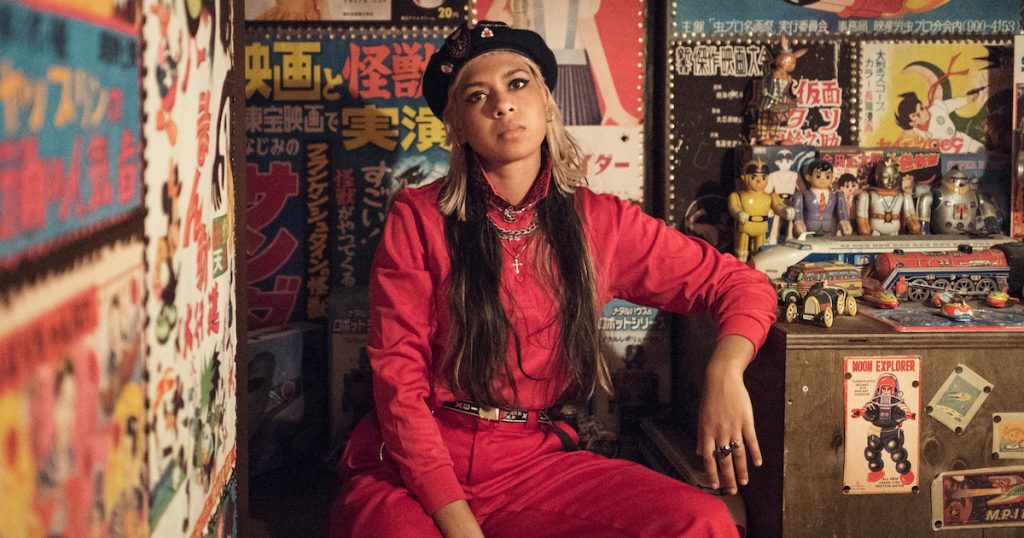
Ecca Vandal
Kidnot: This album is almost like a glorified demo. Ecca would come up with an idea and we’d just run with it, exactly as it was in that moment. We might go to change a few bits and pieces later, but if you start to overthink things, you lose the essence of what made the idea so great to begin with. It’s interesting—the studio we recorded in is right along the Frankston line, and every 20 minutes, we’d have to stop recording because the trains would go past. If you isolate some of the vocals, you can literally hear the trains going by.
Hey, it’s an extra instrument you didn’t even need to track!
Kidnot: Exactly! Even in Brooklyn, when we tracked the vocals for Your Orbit with Darwin Deez, his studio was very simple—you can hear the spill from his monitors into the vocal mic on that track. Our intention was to re-do those vocals when we went back to Melbourne, but there was just this magical tone on that take, and it was like, “Y’know what? Let’s just roll with it.”
You worked out of a home studio too, didn’t you?
Ecca: Yeah, we did almost everything out of our lounge room. It was probably the size of this room, actually. [For reference, we’re in a tiny dining room where it’s a little cramped between the four of us.]
I’m super keen on that vibe, what can you tell us about the setup?
Ecca: It’s just a flat, and we thought we’d just get all the instruments in there and track it ourselves. It sort of started out of necessity—we couldn’t really afford to do the ‘session musician’ thing or record in lush studios. Even though we would love to do all of that stuff one day, I think it really worked for this album. We just started getting sounds together, and we actually started getting attached to some of those sounds so we thought, “Well, we can do this ourselves.” We put a lot of our own money into getting analogue synths and things to record with.
Kidnot: I don’t know how nerdy you want to get, but we record directly to audio, so we don’t really use any MIDI. The only MIDI that we do use is for the drums—we couldn’t afford to hire a space to record actual drums, so we just programmed all of that.
That scream in Broke Days, Party Nights—that’s literally me just screaming under a doona, so the neighbours were probably a bit like, “Oooh, what’s going on in there?” [Laughs].
[ Ecca Vandal ]
Holy shit, I couldn’t even tell.
Kidnot: Yeah, we’re basically just playing them through MPCs and making sure that the kicks feel layered, the snares are on and the hi-hats are off—just making it feel as live as possible. Everything is done with just the two of us as well, so it’s really DIY. And the neighbours hate it!
Ecca: We literally had neighbours come up and go, “Can you turn it down!?” Or, “What’s going on in there!?” That scream in Broke Days, Party Nights—that’s literally me just screaming under a doona, so the neighbours were probably a bit like, “Oooh, what’s going on in there?” [Laughs].
I was reading an interview you did with my old boss last year, where she asked you who you were inspired by and the first name you mentioned was Dennis Lyxzén. What was it like working with him—and also the insanely talented Jason Aalon Butler—on Price Of Life?
Ecca: It was amazing! The fact that we got both of them on the track is almost surreal. That song is inspired by the refugee crisis, and it came about after watching the film Chasing Asylum. I don’t know if you’ve seen it, but it talks about Australia and our approach to embracing refugees—or lack thereof—and it’s brilliant. Dennis has a really strong political voice as well, we love his vocals and Refused had been one of our main inspirations—The Shape Of Punk To Come is one of our favourite records in terms of breaking all the rules and really pushing yourself out of the box—so we just thought, “Why don’t we ask him if he’s interested?” And he said yes! He said that he really liked the track and he really liked the lyrics as they were written, so he tracked it in Sweden and sent us the stems of his vocal. The rest is history!
Kidnot: We met Jason’s wife in LA—we went over there when we went to New York, and we spent a day chilling out with her. She said, “Come back to my house,” so we did, and… I had no idea that she was even married to Jason Aalon Butler! I was totally just, like, [makes phenomenally exaggerated face of shock]. So we ended up hanging out with him, and we had an amazing connection. We just sat up all night talking about records and politics, and we really kicked it off. So when letlive. came and toured at the start of this year, we hung out with him again, and we just said, “Hey man, we’ve got this track…” Ecca really wanted for this track to have a sort of hip-hop approach where you’ve got three MCs going back and forth, but translated into a punk format. And he just was like, “That’s a dope idea!”
On the other end of the spectrum, you’ve got this super lowkey vibe-out banger with Sampa The Great, which is easily one of the most interesting tracks on the album. How did that come about?
Ecca: That song was originally written when we were in New York. We teamed up with Darwin Deez to write the song, and when we came away from that session, we thought it sounded pretty good—a lot of the sounds that you hear are the first ones we came up with, and a lot of the vocal takes are the originals—and we thought that, since this was birthed in Brooklyn and it has a bit of a throwback sound to the golden era of hip-hop, it would be really cool to have an MC on there. And then I met Sampa when we were both on a gig called Her Sound, Her Story, and we just connected. I was telling her about how I’m a big fan of hers, and she was saying that she really loved my music and my videos, and I was like, “Wow, really?” I was so blown away by her talent—she’s a heavyweight! We went to the afterparty together, and she was actually playing me some of her demos in the car, so I thought, “Ah, maybe I should play her my demo, maybe she’d be interested.” So we put that song on, and within a few bars of the beat, she was like, “I’m in. I’m on this one.” She came into the studio, she nailed it, and it just worked out really well.
Kidnot: It was an interesting track, because fundamentally, it stayed very much the same as it was when it was written in New York, but we kind of sat on it for a while, too. We did kind of flip the tune a bit—we added a different progression in the bassline and the verses, and it wasn’t a song that we’d busted out really quickly, like Broke Days, Party Nights which came together in two days. Price Of Living took two days as well, whereas Your Orbit just sat there for a while. We forgot about it, came back to it, changed some things… It just came out very organically. It’s one of my favourite jams of the record
It’s just got a special vibe to it.
Kidnot: It does. For me, personally, it’s being in Brooklyn, looking out the window and seeing New York… It has a very boom bap feel—it’s very Tribe Called Quest, very Jungle Brothers—it’s like that early ‘90s ‘golden era’ hip-hop, y’know? Sampa sounds unreal, Ecca sounds like Lauren Hill in parts—it’s just got that sound—but it’s also got this really psychedelic 1950s vibe to it.
How do you see these songs translating to the stage? Was that something you had in mind when you were bringing these 12 bangers together?
Ecca: It was something we thought about, but it wasn’t at the forefront of our minds because a lot of it is played by us on the record. We’ve got some amazing musicians that interpret our parts—we’ve got a great drummer, Dan Maio, and a great guitarist, Stacey Gray, and Richie also plays live bass and triggers samples. We’ve just started to shape it up, but this time around, we’re going to do a lot of live sampling.
Kidnot: There’s songs where it’s all punk-style guitars, bass and drums, and then suddenly, Stacey and I are just on MPCs.
Ecca: We’re going to put the guitars down for a bit and just do some beats. It’s going to be really fun and interactive, and we’re going to leave an element of risk in there so it’s not like we’re just playing to a track or anything—all of the synths are going to be played live, because we want to keep it fun and we want to keep it a little nerve-wracking. It could all fall over, but that’s part of the fun
Ecca Vandal (the album) is out now via Dew Process/Universal Music. Pick a copy up here!
Ecca Vandal is touring Oz throughout November! Grab tickets here.
Friday November 3rd – Fremantle Town Hall, Fremantle WA
Saturday November 4th – Rocket Bar, Adelaide SA
Thursday November 9th – Cambridge Small Room, Newcastle NSW
Friday November 10th – Oxford Art Factory, Sydney NSW
Saturday November 11th – Rad Bar, Wollongong NSW
Thursday November 16th – Shark Bar, Gold Coast QLD
Friday November 17th – Sol Bar, Coolum QLD
Saturday November 18th – Brightside, Brisbane QLD
Friday November 24th – Karova Lounge, Ballarat VIC
Saturday November 25th – Corner Hotel, Melbourne VIC


